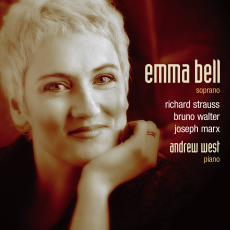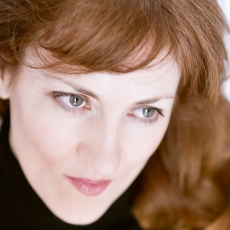Emma Bell - Songs by Richard Strauss, Bruno Walter and Joseph Marx - Atlanta Audio Society
Clear as a bell...
Emma Bell, that is. This recital by the engaging young soprano from the U.K. is, quite simply, a crystal-clear example of what the art of the German lied should sound like. It is also one of the most impressive vocal recitals I've heard in some time. The program includes lieder (art songs) by Richard Strauss and his younger contemporaries Bruno Walter and Joseph Marx. The Walter songs include Tragodie I - III, three songs of ill-fated young love to texts of Heinrich Heine; three splendid songs to poems of Eichendorff, Das Kindes Schlaf (The Child's Sleep), Die Lerche (The Lark), and Elfe (Elves); and three settings of Julius Wolff: Waltrauds Lied I - II and Liebeslust (Joyous Love). Like a born song artist, Bell sensitively encompasses the wide range of moods in these songs, from breathless enchantment to ecstatic joy to deepest pathos. The last-named, Liebeslust, ends on a rising note of rapturous emotion that the singer captures beautifully. Her partner, pianist Andrew West, helps create much of the mood of these songs, especially those in which the spell lingers have the vocal text has finished as in Das Kindes Schlaf, in which the piano line suggests the slow departure of the guardian angels who watched over the child's slumber.
The three songs by Joseph Marx to poems by Paul Heyse, Stefan Zweig, and Rainer Maria Rilke reveal a skillful integration of melodic writing and poetic atmosphere. The virtuoso accompaniment to the Zweig song, Ein Drängen ist in meinem Herzen (A need is in my heart) complements the passion in the vocal text to perfection (translated: "My heart remains mute, the words unspoken, / To tired songs my longing flees, / And hot, hot nights drink my tears.")
The twelve Strauss songs, likewise, reveal the composer at his best. Songs such as Traum durch die Dämmerung (Dreaming through the Twilight) and Schlechtes Wetter (Dreadful Weather) are marvelous tone poems in miniature that allow Bell and West to create vivid pictures in the listener's mind. The first-named, a setting of a poem by Otto Julius Bierbaum, was so memorable that Strauss later used the melody for the "Works of Peace" section of Ein Heldenleben ("Now I go to the loveliest of women, / Across the meadow in the grey twilight, / Deep into bushes of jasmine"). In the latter, to a poem by Heine, we can feel the splashing gusts of rain and see the lonely light of the old woman's lantern as she makes her way down the darkened street.
Lieder like these seem to have been made expressly for the bloom, the great expressive beauty, of Emma Bell's voice. My words fail me: you must hear it to appreciate it. The sheer loveliness of tone throughout her entire vocal range, coupled with the intelligence of her interpretations of the poetic texts, mark her as that rarest of singers, a born art-song artist.

